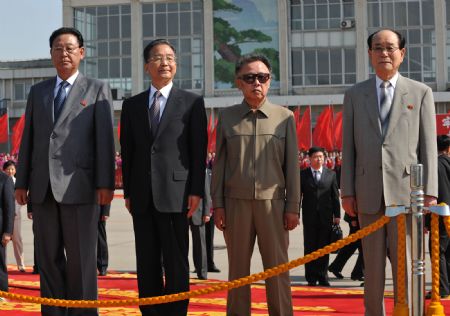China Daily Exclusive
Premier pushes for nuclear-free peninsula
(China Daily)
Updated: 2009-10-05 08:28
 |
Large Medium Small |
|
|
PYONGYANG: Premier Wen Jiabao arrived in the Democratic People's Republic of Korea (DPRK) for talks with top leader Kim Jong-il Sunday.
Wen's three-day visit is the first by a Chinese premier for 18 years and is expected to feature reaffirmation of friendship between the two nations, with the trip coinciding with the 60th anniversary of formal relations between the neighbors.
China Central Television (CCTV) showed Kim Jong-il embracing Wen after his arrival.
Experts said China would not have sent such a senior official unless the visit was to address tensions over the DPRK's nuclear activities, which have recently included nuclear testing and claims the nation has made progress in enriching uranium. They predicted the topic of nuclear weapons will be on the agenda.
In a meeting with Wen, DPRK Premier Kim Yong-il said the country has never abandoned the goal of "denuclearizing" the Korean Peninsula, according to the CCTV.
"We are willing to seek to realize this goal through bilateral and multilateral talks," he said.
Wen said China approved of the DPRK's vow to seek "denuclearisation", the CCTV reported.
"The international community universally agrees on denuclearization of the Korean Peninsula through dialogue and consultation," Wen told Kim Yong-il.
Wen said that China appreciated the DPRK's commitment to the objectives of making the Peninsula nuclear free and stressed that such a commitment is in the interest of all the parties concerned, including the DPRK.
"China is willing to strengthen communication and consultation with the DPRK," Wen added.
Zhu Feng, a professor in international security at Peking University, said earlier that "this visit will be mostly focused on bolstering bilateral ties and the 60th anniversary, but the nuclear issue is sure to come up".
Yang Xiyu, a senior expert on the DPRK with the China Institute of International Studies in Beijing, agreed and said both sides would "take this opportunity to push for the resumption of talks over the Korean Peninsula nuclear issue".
The welcome ceremony at the Pyongyang airport is a sign Kim Jong-il plans to commit to the DPRK's return to the Six-Party Talks, said Paik Hak-soon, an expert in inter-Korean relations with the Sejong Institute in Seoul, capital of the Republic of Korea (ROK).
"The DPRK has found there is a need to stabilize the situation since it has done everything it wanted to do, such as a nuclear test," said Paik.
On arriving in Pyongyang, Wen said he hoped his visit will deepen the nations' friendship, Xinhua reported, but he also said he wanted "a frank and thorough exchange of views with DPRK leaders on bilateral relations and issues of shared concern".
However, Zhang Liangui, a professor at the Central Party School in Beijing, said any talks on the nuclear issue would be limited to each leader restating their nation's stance.
"The DPRK believes the issue is between Pyongyang and Washington," he said, adding China holds the same view.
The Six-Party Talks among the DPRK, the ROK, China, Japan, Russia and the United States ground to a halt about a year ago, with Pyongyang saying it would boycott the sessions, which are aimed at making the Korean Peninsula nuclear-free.
Kim Jong-il has since reportedly expressed a willingness to engage in "bilateral and multilateral talks", although it is unclear if that indicates a desire to rejoin the stalled talks.
The DPRK has reached out to regional powers in recent months, including the US, after the United Nations imposed sanctions following its nuclear test in May.
Wen is leading a delegation that also includes Foreign Minister Yang Jiechi, Deputy Foreign Minister Wu Dawei, General Liu Zhenqi, Commerce Minister Chen Deming and Zhang Ping, chairman of the National Development and Reform Commission.
The Chinese premier paid tribute to former DPRK leader Kim Il-sung at the Kumsusan Memorial Palace and attended signing ceremonies for a series of agreements on cooperation in the fields of trade, education and tourism.
In the evening, Wen and Kim Jong-il watched A Dream of Red Mansions, a DPRK-staged opera adapted from a Chinese masterpiece.
DPRK media yesterday said Wen's visit illustrates the importance China places on its ties with the country.
"Comrade Wen Jiabao's visit to our country this time has a huge meaning in consideration of its historical timing and political significance," said an editorial in the DPRK's main newspaper, Rodong Sinmun.
The trip "also clearly shows the Chinese Party and government think much of the China-DPRK friendship", the editorial added.






